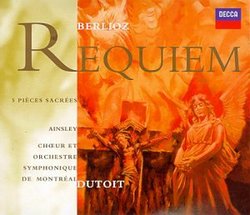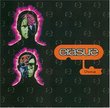| All Artists: Hector Berlioz, Charles Dutoit, John Mark Ainsley Title: Berlioz - Requiem � 5 pi�ces sacr�es / Ainsley � Choeur et Orchestre Symphonique du Montr�al � Dutoit Members Wishing: 0 Total Copies: 0 Label: Decca Release Date: 1/11/2000 Genre: Classical Styles: Opera & Classical Vocal, Chamber Music, Historical Periods, Classical (c.1770-1830), Early Music, Sacred & Religious Number of Discs: 2 SwapaCD Credits: 2 UPC: 028945892122 |
Search - Hector Berlioz, Charles Dutoit, John Mark Ainsley :: Berlioz - Requiem � 5 pi�ces sacr�es / Ainsley � Choeur et Orchestre Symphonique du Montr�al � Dutoit
 | Hector Berlioz, Charles Dutoit, John Mark Ainsley Berlioz - Requiem � 5 pi�ces sacr�es / Ainsley � Choeur et Orchestre Symphonique du Montr�al � Dutoit Genre: Classical
This set has macabre appeal for collectors of worst recorded performances, since this failed Berlioz Requiem is a perfect example of the ghastly breed. Dutoit sleepwalks through one of music's most thrilling scores, leadin... more » |
Larger Image |
CD DetailsSynopsis
Amazon.com This set has macabre appeal for collectors of worst recorded performances, since this failed Berlioz Requiem is a perfect example of the ghastly breed. Dutoit sleepwalks through one of music's most thrilling scores, leading what sounds like a first rehearsal run-through. Even the Dies irae and Tuba Mirum, which never fail to strike terror, are soporific. Most of the music is, of course, more contemplative, but Dutoit utterly fails to capture its mystery and intensity--it's just slow and choppy. Fine engineering can't save this, nor can the good performances of the choral works that fill out the discs. Get Bernstein on Sony or Munch on RCA to hear what this piece is all about. --Dan Davis Similarly Requested CDs
|
CD ReviewsBerlioz Regained Alex Moffat | Wichita Falls, Texas USA | 07/03/2000 (5 out of 5 stars) "Allow me to dissent from Amazon's reviewer. When, many years ago, I was in college, the Requiem was a "high-fidelity" item. That is, the more sound you could produce without actually blowing your speakers, the better recording. Dutoit's performance does not go in for gratuitous noise and reminds me that this is the same Berlioz who wrote L'Enfance du Christ.The power is still there: the Lacrymosa and the Benedictus still roll to thundrous climaxes. But most of the Requiem is lyrical and, although Berlioz is said not to have been a believer, approaches being liturgical. The work itself has some dull spots (so does Les Troyens) but not many. Throughout this performance everything is clear--my Latin is not good enough to comment on the diction, but the music is articulated with loving care. Counterpoint, harmony, and inner voicing are all audible and balanced.The five sacred pieces, rarely heard, are a worthwile bonus. The last, the Resurrexit from an earlier mass, is particularly interesting because Berlioz used part of it in the Requiem, improving it greatly. Some of the rest of it sounds like failed Rossini, and Berlioz was clearly correct in deciding not to go farther in that direction.Excellent, but different from what you have heard before." Superb!! Christopher Losee | Bronxville, NY United States | 07/25/2002 (5 out of 5 stars) "Before I rave about this well-played and well-recorded Requiem, I can see why many people would not cling to this recording. This is because Charles Dutoit takes an approach to this piece like no conductor before him. Whether you agree with the interpretations or not, new ways of performing a piece should always be applauded. Dutoit lets this piece shine with the highlight not being the actual forces that make up this huge work, but by the quality of the playing. Each meoldic line and harmonic note is brought out to give the listener something new to listen for. When I first heard it, I noticed many colors and effects that I never noticed before, especially in the Sanctus (which is probably the best track in this recording). The Montreal Symphony has excellent intonation in relation to the chorus. The balance between the singers and orchestra is terrific, and probably the best out of any Berlioz Requiem recording. Listen for yourself and enjoy what you hear, because I bet you'll be surprised by what you have never noticed before." A masterpiece still in search of a truly great reading MartinP | Nijmegen, The Netherlands | 12/10/2002 (4 out of 5 stars) "OK, I know you can't say things like this, but I'm going to say it anyway: this is the greatest Requiem ever written. If I could own only one requiem I would gladly chuck out Mozart, Fauré, Britten and Brahms, and Verdi's ridiculously overestimated version on top, and hang on to this one. You may think of Berlioz as the composer of bizarre, unbalanced and bombastic works ("So you are the man who writes music for 500 performers", said Fürst Metternich on meeting the composer; "Oh no, your excellency," replied Berlioz, "sometimes I write for only 450"). This work cannot but change that view. Though very large forces are called for, these are used to diversify rather than amplify sound. The full contingent of brass and percussion is only used twice in the 90 minute span of the piece. This is intensely sombre and serious music. Berlioz had a strange affinity with death, and knows to communicate it (there is a harrowing scene in his memoirs where he describes in detail the exhumation of the body of his dear Harriet many years after her death - that same sense of the futility of life, and the sheer horror and loneliness of death, pervades much of this piece). The music is dictated by psychological insight, not melodic inspiration. The Kyrie for instance is hardly music at all, only a quiet, desperate muttering. Nor does the Dies Irae open with a cheaply effective 'coupe de theatre' à la Verdi, but with a quiet, sad melody on cello's and double basses, and a pianissimo unison line of soprano's and flute wandering forlornly through a vast empty space. From this a march gradually emerges, which then slowly builds up to the tremendous outburst of the Tuba Mirum.
The orchestration is an absolute work of genius and often way ahead of its time. In one place, the orchestral accompaniment is reduced to mere alternating chords of three flutes, high up, and eight trombones in their lowest register, creating a sense of musical vertigo, if such a thing exists; in another, the choir sings the same two notes throughout while a marvellous set of orchestral variations is developed simultaneously. The Lacrymosa is simply mind-boggling, undoubtedly one of the most overwhelming pieces of choral music ever written. The Agnus Dei picks up some threads heard earlier in the work and then ends with a series of serenely comforting 'Amen's', strings playing luminous slow arppeggio's while six timpani emulate something like a tired, irregular heartbeat.Though some decent recordings of this work are available, it has not been as lucky on disc as it deserves, and none of the existing recordings that I'm familiar with does it full justice. Previn and Davis are serviceable and at times impressive; Ozawa is bland and forgettable, nor did the Levine reading stick in my memory long; I'm still curious about the much lauded Shaw, though my experiences with his Mahler 8 also engender some doubts; this Montréal recording, finally, is easily the most beautiful of those I know. Dutoit takes a relaxed and moderate view of the work, very much concerned with bringing out its many beauties. In doing so he renders it less confronting than it should be, but it remains a very moving experience indeed. The two Big Moments are powerful, though they don't convey the feeling of so many drums rolling at full force as the score shows there are (Previn succeeds best in this passage). The singing and playing are beyond criticism throughout, and the recorded sound, if at times slightly blurry and a bit underpowered, is pleasantly mellow and generally excellent. Still, dear John Eliot Gardiner, could you be persuaded to please, please, round up all period instrument players in Europe and expand your Monteverdi choir a bit for the occasion to give us the definitive account of this sublime work?" |

 Track Listings (7) - Disc #1
Track Listings (7) - Disc #1







